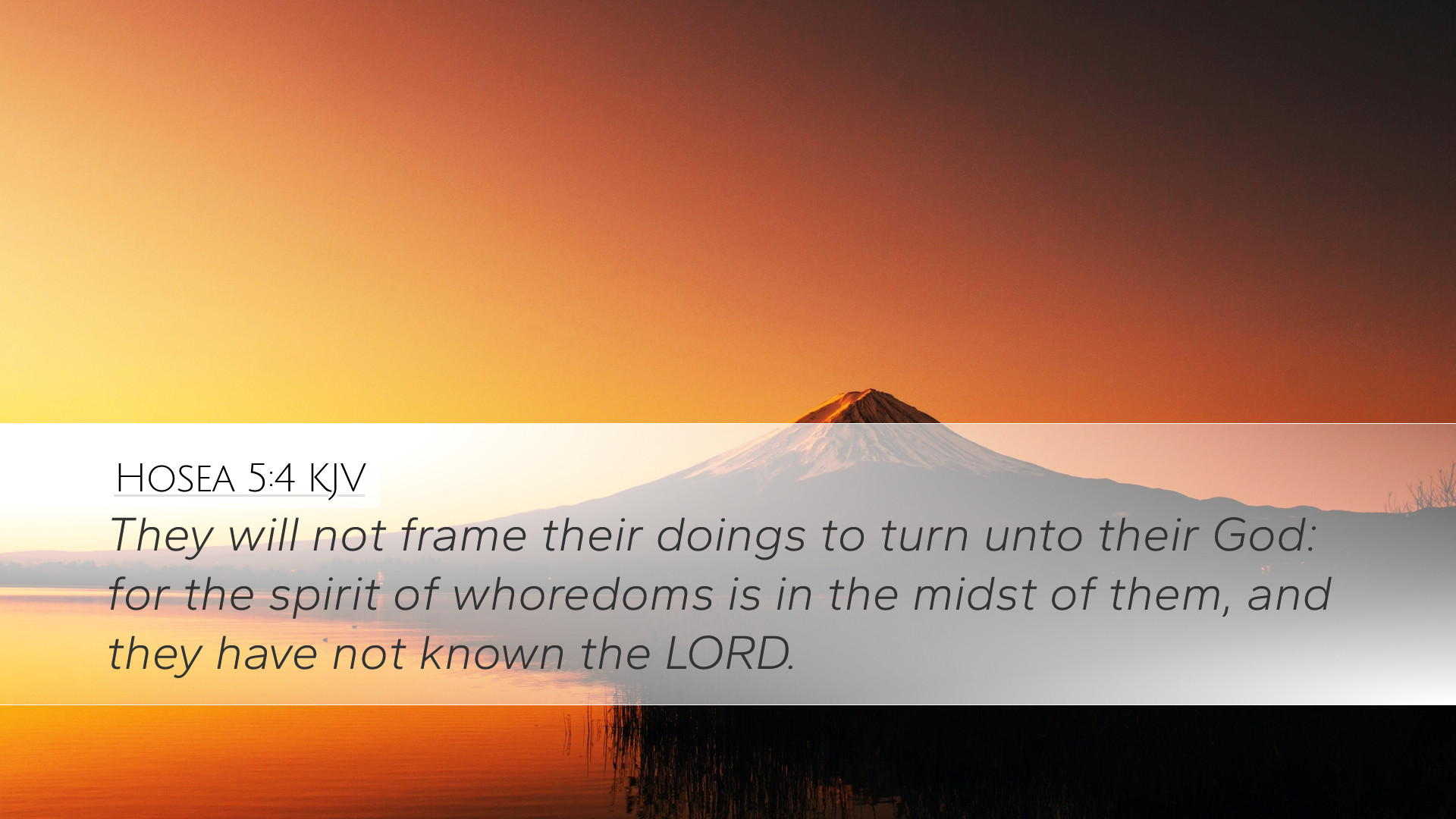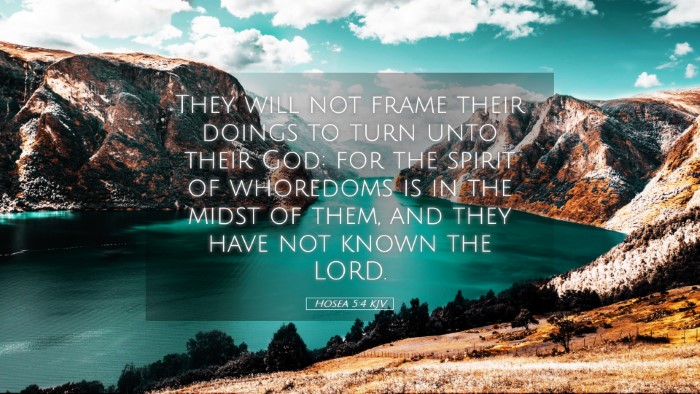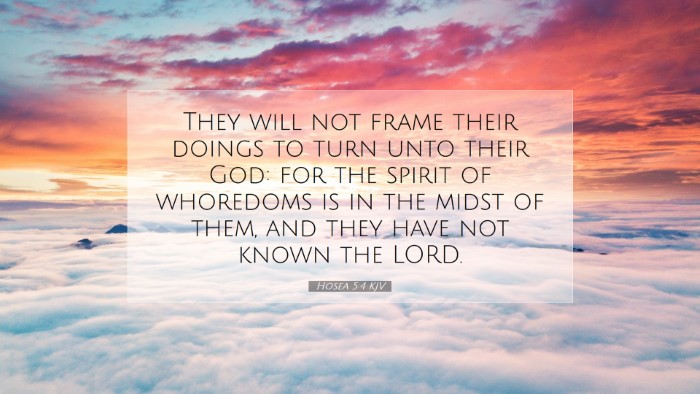Old Testament
Genesis Exodus Leviticus Numbers Deuteronomy Joshua Judges Ruth 1 Samuel 2 Samuel 1 Kings 2 Kings 1 Chronicles 2 Chronicles Ezra Nehemiah Esther Job Psalms Proverbs Ecclesiastes Song of Solomon Isaiah Jeremiah Lamentations Ezekiel Daniel Hosea Joel Amos Obadiah Jonah Micah Nahum Habakkuk Zephaniah Haggai Zechariah MalachiHosea 5:4
Hosea 5:4 KJV
They will not frame their doings to turn unto their God: for the spirit of whoredoms is in the midst of them, and they have not known the LORD.
Hosea 5:4 Bible Commentary
Bible Commentary on Hosea 5:4
Verse Text: "They will not frame their doings to turn unto their God: for the spirit of whoredoms is in the midst of them, and they have not known the LORD." (Hosea 5:4)
Introduction
The Book of Hosea is a profound prophetic text that encapsulates the relationship between God and His unfaithful people, Israel. In chapter 5, the prophet speaks to the moral and spiritual failures of Israel, emphasized in verse 4. This commentary seeks to unpack the significance of this verse using insights from renowned public domain commentaries by Matthew Henry, Albert Barnes, and Adam Clarke.
Textual Analysis
- Spiritual Condition: The phrase "they will not frame their doings to turn unto their God" highlights a conscious refusal among the people of Israel to adjust their lives in accordance with God's will. This verse encapsulates a spiritual apathy that pervades the nation.
- Spirit of Whoredoms: The "spirit of whoredoms" indicates a pervasive moral corruption. It signifies not merely physical unfaithfulness but also a deeper spiritual infidelity—turning away from the covenant relationship with God towards idolatry and sin.
- Knowledge of God: Finally, the statement "they have not known the LORD" points to a relational disconnect. Knowing God exceeds mere intellectual acknowledgment; it implies a relationship characterized by faithfulness, obedience, and intimacy.
Theological Themes
This verse reflects several overarching theological themes:
- God's Desire for Relationship: Hosea's message emphasizes that God desires an interactive relationship with His people, marked by loyalty and fidelity.
- The Nature of Sin: The verse illustrates the pervasive nature of sin, illustrating how it corrupts the heart and mind, leading to a complete alienation from God.
- Call to Repentance: Implicit in the indictment of Israel's sin is a call to repentance. The acknowledgment of wrongdoing is the first step towards restoration.
Commentary Insights
Matthew Henry's Perspective
Matthew Henry emphasizes the tragic state of Israel's heart. He notes that their lack of desire to return to God signifies a profound moral decline. Henry illustrates that this refusal stems from a heart intoxicated by sin, leading to estrangement from the Creator. He warns readers that, like Israel, they may also become ensnared by worldly desires, forgetting the covenantal obligations to God.
Albert Barnes' Exegesis
Albert Barnes elaborates on the concept of "the spirit of whoredoms." He connects this phrase to the idolatrous practices prevalent in Israel, indicating that this spirit is an active force drawing the people further from their divine calling. Barnes draws attention to the consequences of ignoring God's commands, stating that the ultimate result of such disregard is spiritual desolation and the eventual judgment that follows.
Adam Clarke's Analysis
Adam Clarke provides a historical context to Hosea’s words, noting that the political and spiritual instability of the time contributed to Israel's straying from God. He highlights that the people did not simply forget their Creator; rather, they made a deliberate choice to pursue other gods. Clarke encourages readers to understand the gravity of such choices and the importance of remaining faithful in our own spiritual walk.
Application for Today
In examining Hosea 5:4, modern readers—including pastors, students, and theologians—are prompted to reflect on their own spiritual condition. The verse serves as a mirror, revealing how easily one can become ensnared by a "spirit of whoredoms" in contemporary society. It serves as a reminder of the call to faithfulness and the importance of nurturing a vibrant relationship with God.
Practical Considerations
- Self-Examination: Believers are invited to regularly assess their spiritual lives and check for signs of apathy or idolatry.
- Education on Idolatry: Churches should educate congregants on modern forms of idolatry that may draw them away from God.
- Encouragement for Repentance: Spiritual leaders should create environments that encourage confession and repentance, highlighting God's readiness to restore.
Conclusion
Hosea 5:4 is a compelling verse that calls both ancient and modern believers to recognize the profound depths of spiritual infidelity. The insights from Matthew Henry, Albert Barnes, and Adam Clarke together emphasize the necessity of returning to God, overcoming the entrapments of sin, and fostering a relational knowledge of the Lord. As we reflect on this, may we pursue a faith that is responsive, vibrant, and truly devoted to God.


